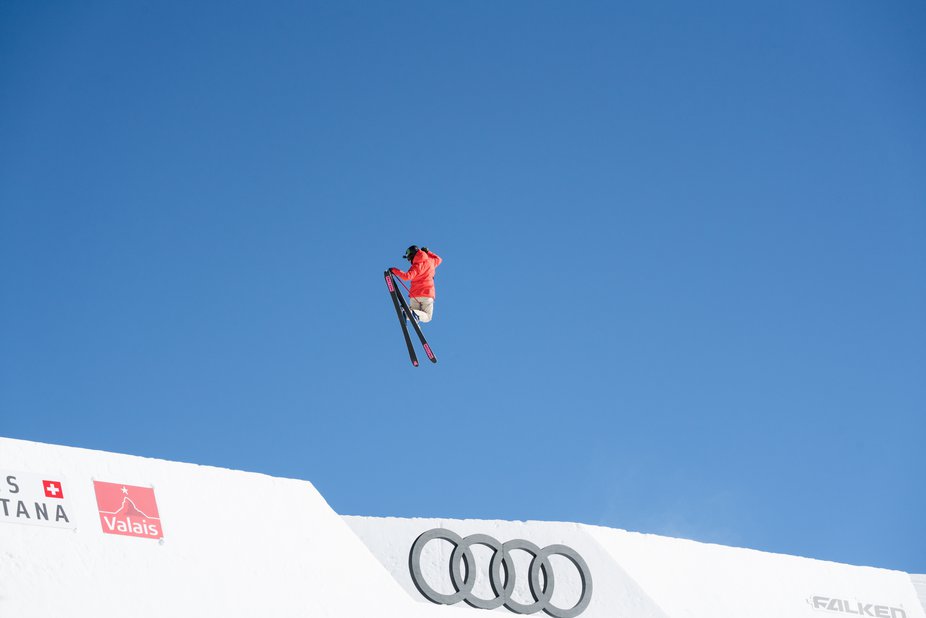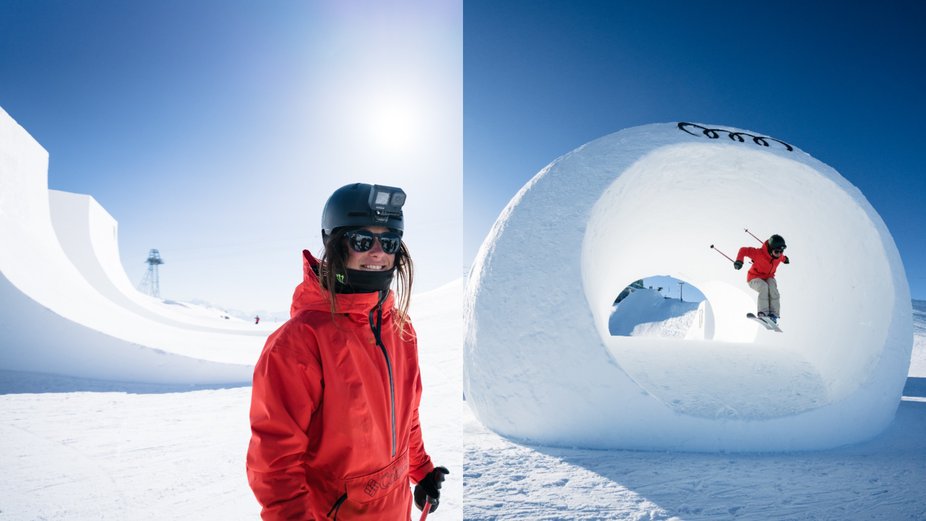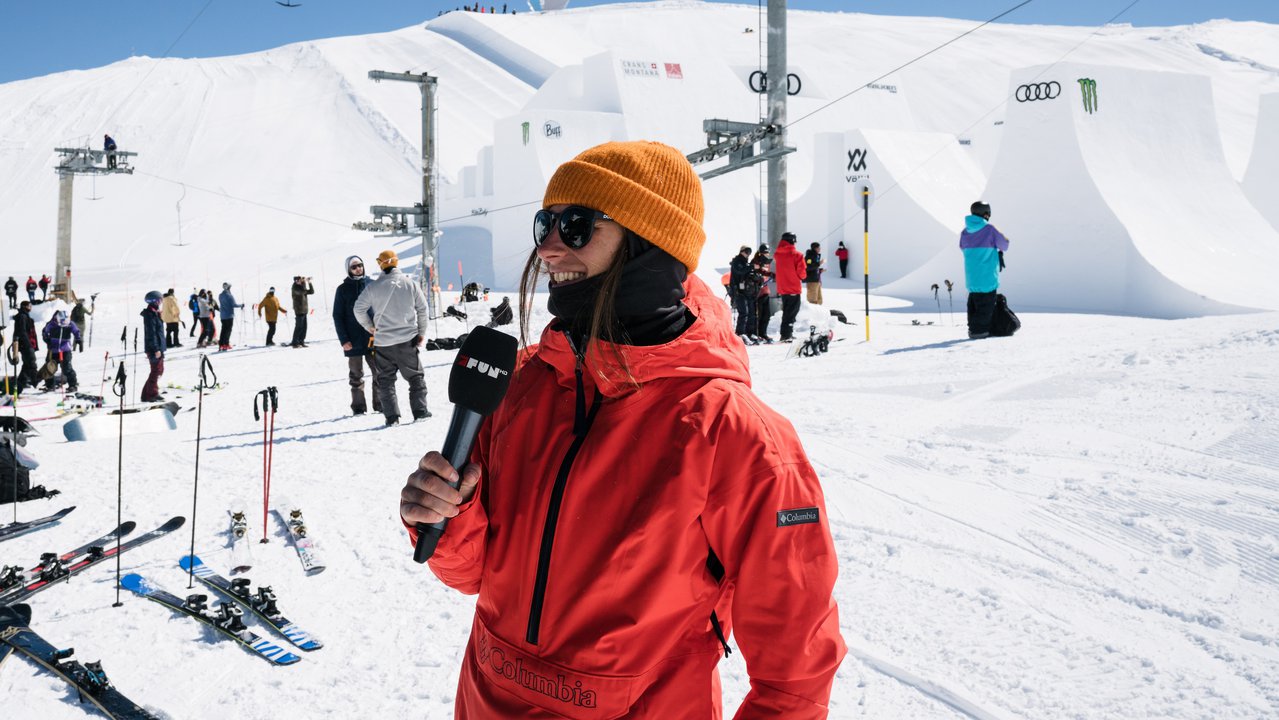Cover photo: Life in a lens feat. Columbia's Dust On Crust Anorak
Sarah Hoefflin is far from your typical pro skier. For one thing, at 20, she was a self-proclaimed ‘punter (jerry)’ with a penchant for sending it. Now she has Olympic and X Games gold medals to her name, as well as multiple FIS Crystal Globes. She’s an avid monoskier, panaché drinker, and road biker. Her degree in neuroscience --which apparently is harder than slopestyle, but VERY easy to walk away from to pursue a ski career-- is maybe a clue to her life before she found freeskiing, in her early twenties.
Sarah was born in Geneva, Switzerland, but moved to England when she was 12, and then studied for her degree at a university in Wales. It was during University that she first took a run through a terrain park.
“I thought I was a good skier, but I really wasn’t. I was just a total ‘uni-skier’, who thought she was really good.”
I genuinely couldn’t tell that English wasn’t actually her first language when I first met her. Just to keep things nice and mixed up, her dad is Swiss and her mum’s actually from New Zealand.

Sarah flying high in Crans-Montana last spring
_
As a competition skier, Sarah spends more than half of the year on the road. The Swiss Olympic gold medallist’s season usually starts around September and goes through to May, with some summer skiing thrown in there too. It’s a busy life at the top.
“In early November, the competition season starts, so we’d usually be training around Europe, either in Austria or on the glaciers in Switzerland before that. This year the first comp is in October, which makes things even busier. We usually have two or three contests before Christmas.”
The global pandemic has affected almost everything, in everyone’s lives, but it might actually be that one of freeskiing’s most divisive topics has lessened its impact on the skiers:
“I guess because it’s an Olympic sport now and that carries a certain weight when you’re asking authorities for authorization of travel. We’ve definitely had a bit more of a lenient time than ‘regular people’ for entering countries and moving around. We haven’t been able to do everything. Last year the only country, outside of Europe, that I went to, was the U.S, but I did manage to go there twice and the borders were closed for pretty much everyone.”
She says everything’s done behind the scenes, so it’s difficult to know exactly how easily she got into the States. By the time she got to the airport, her federation had already done all of the background work in order for her to be able to travel.
Almost all of her traveling is done with the Swiss freeski team. “It’s really fun. We don’t take ourselves too seriously so it’s a really fun team to be with.” The size and strength of the team keep the mood on the road pretty high too, as there’s usually someone celebrating. Switzerland has four official languages, so those celebrations could be hard to follow, from the outside. Apparently, it’s predominantly Swiss-German that’s spoken. But, to avoid confusion, sometimes they just speak English. Sarah also speaks French to her coach and Mathilde Gremaud.
The national team now plays a huge role in being able to pursue a freeski career, at least on the competition side of things. The other thing that makes it possible? Sponsors.
For those of you reading this, with hopes of making a career out of skiing, there are a few ways to go about finding a company that’ll pay you to do it!
“It really depends what kind of sponsor you want and what kind of status you have. They look at your social media; how active and interesting you are. They also look at your results, if you’re someone who’s consistently on podiums or in the spotlight, you’re probably more attractive to sponsors.”
It’s definitely not always easy though. Even as a gold-medallist she says that she was actually surprised how long it took to find sponsors after the Olympics.
“I do have a manager, who finds sponsors for me, so that’s another thing that’s happening behind the curtain a little bit. I don’t always know or understand how much work goes into finding sponsors. It really depends on what kind of sponsor you’re looking for. If you’re just starting out pursuing skiing as a career, and you want a clothing sponsor and just a small brand to give you a few t-shirts, jackets, or whatever, I don’t think it takes that long. Just make an edit, show them that you’re passionate about skiing, and show that you’re someone that’s worth sponsoring and if the brand likes you, then I think you could find a sponsor pretty quickly. Just a few emails or phone calls back and forth. But it also depends, it took a while for me to find the brands I work with now.”
With so much of her life spent either on the road or on the mountain, Sarah says that going into her third year with the Portland-based sportswear brand, Columbia, she has found a perfect match and that the diversity of their range is key.
“I wear it for everything. On and off the mountain. Obviously, I wear it for skiing, primarily, but they have some really cool urban/street pieces. They also make a huge range of sports clothes for outdoor sports; trekking or climbing or walking through the mountains.”
That’s a massive plus, for the now Chamonix-local, who does a bit of climbing in the summer, a whole lot of cycling, and all the other “Typical-Chamonix” sports.

_
When she’s off the hill, and Sarah does get the odd quiet week between October and May, she uses the opportunity to take time for herself and unwind back at home in Chamonix. That’s where she keeps that Olympic Gold medal hanging in the toilet of her studio apartment overlooking Mont Blanc, by the way.
Around Chamonix, the Alps, and neighboring Switzerland, people definitely know who she is. That probably comes largely as a result of that bit of metal hanging in her bathroom. The 2018 Olympic Slopestyle champ definitely doesn’t let it go to her head though and she doesn’t really consider herself to be a celebrity.
“It’s not really something I ever strive for. It’s actually something I’ve actively avoided. But what the Olympics did do was it really opened a lot of doors for me. I got to meet a lot of people I never would have met otherwise, I got to go to some schools and give talks, which was really interesting.”
It’s also given her the opportunity to talk about the things she finds important and share those with a wider audience than just freeskiers.
“I’ve had the chance to speak about things like climate change, respecting nature, taking up skiing, and getting more women into the sport. Things that are so important to me. That was all positive.”
Talk of the positives, naturally led to wondering if there were any negatives? Maybe you won’t be surprised to hear that an Olympic gold medal is heavy on the positives, but in the beginning, she said she wasn’t really used to doing interviews all the time (sorry about this Sarah!) and people taking pictures of her, with her, etc. “I was a bit shy at first, but I got used to it.”
She still isn’t a natural self-promoter. You certainly wouldn’t know upon meeting her, on-hill or off it, that she has a trophy cabinet (and bathroom) full of medals and trophies. She still loves to ski from first lift to last, still doesn’t love social media or the limelight and there’s definitely still a bit of the uni-skier and neuroscientist in there somewhere. She’s proof that there’s no set route to follow to the top of that X Games or even Olympic Podium, although clear natural talent and a willingness to crash a lot have certainly helped Sarah’s late rise to the top.
With a street-inspired edit dropping this fall and another strong showing in Faction’s latest movie, you can see her skiing diversifying as her career progresses too. Of course, the comp scene will be the major focus again this season. She timed it perfectly for the last Olympic cycle and you wouldn’t bet against another strong showing at the big events this winter.
_
This article was produced in partnership with Columbia Sportswear


Comments